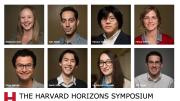Eight rapid-fire, TED-style talks of five minutes each by Harvard Ph.D. students kicked off the inaugural Harvard Horizons symposium on May 6 in Sanders Theatre. The Graduate School of Arts and Sciences (GSAS) program, featuring the most innovative thinking of a select group of doctoral candidates, was conceived by Reischauer Institute professor of cultural history Shigehisa Kuriyama with the support of GSAS dean Xiao-Li Meng, who referred to the two men’s own experiences as graduate students at Harvard and pointed out that fully a quarter of Faculty of Arts and Sciences (FAS) members have doctorates from GSAS.
A January call for applications drew 55 students; 15 semi-finalists were chosen for a round of interviews with a cross-disciplinary faculty committee. The inaugural eight Harvard Horizons scholars then received in-depth mentoring and coaching in oratorical and other presentation skills from faculty members and other experts, in particular, from assistant professor of visual and environmental studies Laura Frahm and Pamela Pollock, assistant director of the Derek Bok Center for Teaching and Learning. As Dean Meng said in his opening remarks, “Wouldn’t it be wonderful” if Harvard students were known as great speakers, besides being known for their intellect? This explicit, pedagogical aim—and the diverse mix of winners, representing the humanities, the arts, and the sciences—distinguished the event from similar programs that focus on applied student work in science and engineering.
At Sanders Theatre, the Horizons scholars’ talks covered the social power of music; fiction’s role in helping people understand globalization; a prior century’s forays into distance learning; the use of advertising in war and peace; the way that computers have changed mathematical proofs; and brain science, vaccines, and DNA sequencing.
- Fenna Krienen, of the psychology department, spoke about her work on the connectome, a project to map the human brain, which researchers now know is not as modular as was once thought. “Even the most basic functions,” she said, “emerge from dynamic networks in the brain.”
- Hansun Hsiung (East Asian languages and civilizations) explained how English-language textbooks were translated and used in Asian classrooms in the nineteenth century, calling it “the first real attempt at distance education.” He noted that when knowledge moves, it also changes, and provided a graphic example in the form of a likeness of Thomas Jefferson, reproduced by Asian printers as an example of what a Caucasian man looks like. This, he suggested, was an example of how, at a distance, people learn in unexpected ways. The increasingly Asian character of Jefferson’s features in subsequent editions provides a further lesson for current experiments in online education: “When we set knowledge free, we must also sometimes relinquish our own control.”
- Jeffrey Teigler (Division of Medical Sciences) spelled out why the creation of vaccines to prevent human disease is not straightforward. Cytokines (certain substances secreted by specific cells of the immune system) are the language of that system, he explained by way of analogy, and a given vaccine will not elicit an identical message every time. By trying to understand the language itself—reducing ambiguity—he hopes to make better vaccines.
- Liz Maynes-Aminzade (English) described how a genre of modern fiction can help people understand their place in a networked world. “The kinds of fictions I’ve been calling macrorealism,”she said—television series such as The Wire (2002-2008), for example—“can shape how we imagine ourselves as connected to and responsible for people who are far away from us: people we don’t know, people we can’t see, people we might never meet.”
- Aaron Kuan (applied physics) spoke about the need for faster DNA sequencing of patients in order to deliver personalized cancer medicine, and his ambition to achieve this through the use of synthetic nanopores (tiny holes in a thin membrane, just big enough to allow a single DNA molecule of to pass through).
- Alex Fattal (anthropology) reflected on the Colombian government’s use of advertising to help demobilize the FARC guerrilla insurgency that has plagued the country since the 1960s.
- Stephanie Dick (history of science) spoke about the influence of computers on mathematics, and how the nature of proofs and what constitutes mathematical knowledge has changed in the digital age.
- Edgar Barroso (music), who spoke last, explained how music had led him to explore subjects in psychology, computer science, digital media, history, physics, and a variety of other disciplines, and how he eventually began to ask scholars in those disciplines for help with his own field of study. Music is like “a glue” that binds many fields of knowledge,” he said. “It brings us together. If we make an effort to collaborate…I believe we will have better music, better science, and ultimately, a better society.”
After the presentations and awarding of certificates to the scholars, Meng thanked Stephen Blyth, professor of the practice in statistics and managing director and head of public markets for Harvard Management Company, for his support of the Dean’s Innovation Fund, which made the Harvard Horizons program possible. During their own days as Harvard doctoral students, Blyth then recounted, he and Meng wrote a paper together that he described—to laughter from the audience—as both the most-cited in his career, and the least cited in Meng’s.
That spirit of collaboration was echoed forcefully by Stephanie Dick, who spoke on behalf of the Harvard Horizons scholars. “We have truly bonded as colleagues,” she said, “and have become invested in each other’s work in a way that is still uncommon across disciplines.”









